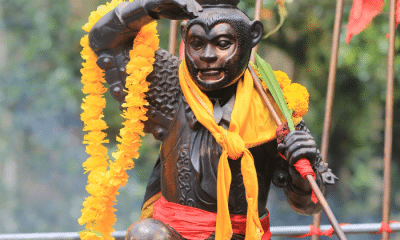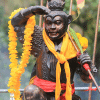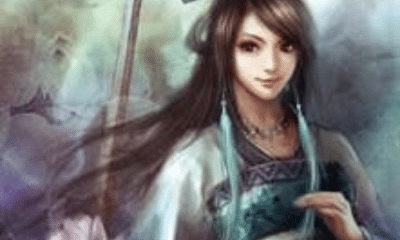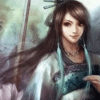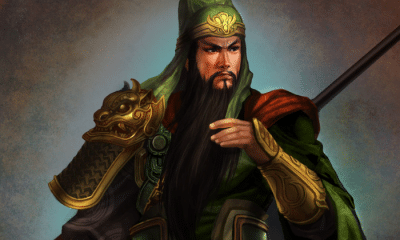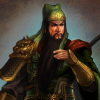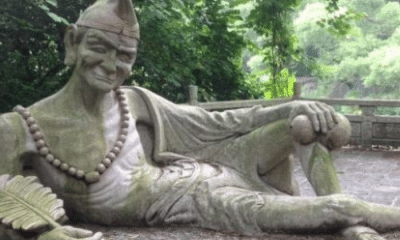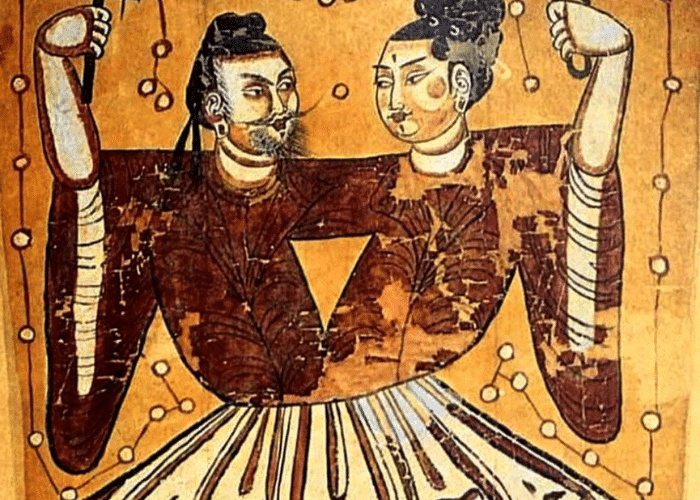
Chinese
Who Was Fuxi in Chinese Mythology?
Who Was Fuxi in Chinese Mythology?
Fuxi is the ancestor of all of mankind, but his role in their actual creation was not as important as what he gave them afterward. Read on to learn all about Fuxi and the role he played in humankind’s development!
As the first of China’s Three Sovereigns, Fuxi plays a major role in the culture’s legendary history.
While the period of the Three Sovereigns and Five Emperors is no longer understood as literal history, many people believe it reflects the development of Chinese culture in the ancient past. From the creation of mankind to the development of a complex political and social structure, these eight rulers represent the beginnings of civilization in China.
The first man, Fuxi, therefore represents China’s earliest beginnings. Teaching the people he helped to create how to cast metal, domesticate animals, and create laws, he represents the transition out of Stone Age culture.
Some people believe, however, that Fuxi was not China’s true first leader. Looking at both history and legend, they think the first Sovereign may, in fact, have been the first woman instead of the first man.
Fuxi the Creator God
According to legend, Fuxi and his sister Nuwa were the first people to be born.
Several different stories are given for their birth. One claims that they were children of the Jade Emperor, while another says that their mother Huaxu fell pregnant after stepping in the thunder god Leigong’s footprint.
While they were said to be the first people, Fuxi and his twin sister are generally not depicted as entirely human. They have human faces but the bodies of serpents.
The two lived together on Mount Kunlun. Because they had no other peers, they eventually wished to marry one another.
Even though there were no other people, the marriage was still taboo. Legend says that they asked for a sign to show that their union would be allowed.
They built a fire on their mountainside and watched as the tendrils of smoke intertwined and merged into one column. Seeing this as the sig they had asked for, they were married on Mount Kunlun.
This was the first marriage ceremony and set the standard for the practice in later culture. Fuxi and Nuwa began the practice of offering sacrifices and prayers to mark an impending marriage.
Although they had a sign from the gods, Fuxi and Nuwa were still ashamed of their incestuous marriage. They covered their bodies in leaves to hide themselves from view, creating the first clothing.
Fuxi and Nuwa became the parents of the first generation of people. Some say that these people were born into their marriage, while others say that Fuxi assisted his sister in creating them from raw clay.
However the first people came into being, Fuxi and Nuwa took care to watch over them.
The first people lived only slightly better than wild animals. They wandered the land gathering food whenever they could find it with no social order or planning.
Looking at the ordered, cultured world of Heaven, Fuxi decided that his offspring were capable of much more than this crude existence. He laid down the first laws to govern their behavior and lay the foundations for their culture.
The first people did not know any way to get food other than by hunting game. Fuxi saw that they ate well when they killed an animal, but when several days passed without a successful hunt they began to starve.
Feeling sorry for his children, he plunged his hands into a river and pulled out an armful of fish. He showed the people how to catch fish as well to keep them from going hungry as often.
This angered the Dragon King, however, because he worried that his waters would be depopulated if people caught all the fish. When he forbade them from fishing with their hands, Fuxi invented the first nets to work around the dragon’s decree.
Fuxi still worried that his children would go hungry, however. He began to think of new ways to keep them fed.
He showed them how to domesticate livestock so they would not have to spend time searching for wild game. He taught them to preserve meat after they butchered it and to exchange gifts so people would share their food and goods.
Fuxi is also sometimes credited with teaching men to smelt metal and make the first coins. This gave them tools to obtain food more easily and a means of buying meat when they had none of their own.
He is also said to have invented the bagua, or eight trigrams. These symbols are said to represent the fundamental principles of reality and form the basis for feng shui. Their creation was the beginning of religious knowledge.
My Modern Interpretation
Chinese history usually begins with Three Sovereigns and Five Emperors. Fuxi is believed to have been the first of the Three Sovereigns, humanity’s first leader.
Some historians believe that the legends of Fuxi and his sister represent China’s transition from a matriarchal society to a patriarchal one.
Their mother, Huaxu, created the first life with Fuxi and Nuwa. As the only parental presence on earth, she was their de facto superior while they were children.
As the pair grew, however, Nuwa seemed to have a more powerful position than her brother. Rulership was being passed from mother to daughter instead of going through the son.
In the story of mankind’s creation, for example, Fuxi is given a secondary role. Nuwa shaped men out of clay and, if he is mentioned at all in the event, Fuxi is described only as assisting her.
When a battle between the gods tore a hole in the heavens, Nuwa was the one to fix it and save humanity. Next to this feat, her brother’s early accomplishments seem paltry.
The story changed, however, to put Fuxi more firmly in the position of leadership.
Scholars point to the establishment of marriage in the story as the turning point that began a transition to a patriarchal system. Soon after, Fuxi began to decree laws and make more decisions that affected humanity’s fate.
These historians see the story as a development of the time in history when Chinese culture underwent a similar change.
Like many cultures, the early people of China likely lived under a matriarchal system. Like most cultures, however, this system changed through the ages.
Anthropologists point to several factors in the development of more male-dominated societies. The beginnings of agriculture and accumulation of wealth are chief among these.
In hunter-gatherer cultures, there was less division of labor based on gender. As seen in surviving hunter-gatherer societies, both labor and supplies tend to be shared among the community and lineage is traced most often through the mother’s line instead of the father’s.
When people began to domesticate livestock and grow crops, they created more permanent settlements. Ownership of land developed, as well as the surplus stores and material wealth that accompanied farming.
The gendered division of labor became more clear and property became something that could be inherited on a much larger scale. The need to defend one’s property also came into consideration.
Land and goods came to be seen as the purview of men because they were the ones who defended it from outside threats. As women took more domestic roles, men were the ones who were most visible in both working the land and fighting for it.
In marriage, women would join the household of their husband’s family because the males were seen as the owners of the home. With family lineage being traced through the male line, the patriarchal culture began to fully emerge.
Fuxi’s story reflects many of these themes. Nuwa was initially a more dominant presence, but as Fuxi developed animal husbandry and the first societal laws, he became the leader.
Scholars who support this reading of the story believe that the story of Nuwa and Fuxi may be based on the transition to a patriarchal culture. Fuxi should be understood not as the father of all of humanity, but as the father of what would become the male-dominated culture that followed China’s matriarchal beginnings.
Because the traditions of the Three Sovereigns and Five Emperors are varied, no definite list exists that identifies them all. Some people now believe that Fuxi should be properly identified as the second Sovereign and that his sister Nuwa was, in fact, the first leader of the Chinese people.
In Summary
In the Chinese creation myth, Fuxi and his twin sister Nuwa were the first people created. They had snakelike bodies, but are generally thought to have been the progenitors of the human race.
Because they were the first beings born on earth, they were alone in their home on Mount Kunlun. Asking for a sign from the gods, they were allowed to be the only brother and sister to marry without committing a crime.
Nuwa created the first people. While some say that she gave birth to them, most people say she sculpted them from clay with Fuxi as her assistant.
While Nuwa played a dominant role in the earliest history of these new people, Fuxi emerged as their ruler. Beginning with the establishment of the first laws, he became the authority figure of the new world.
To keep his children fed and happy, he taught them new ways of obtaining food. This included fishing and raising livestock in addition to inventing money and gifts to get food from others.
Some modern historians believe that the legends of Fuxi represent the transition from Stone Age culture. Agriculture, metalworking, and the first settled communities all emerged at this time.
With them came a different social structure. While Neolithic China was, like most hunter-gatherer societies, more matrilineal, the establishment of property and land ownership moved society toward a more patriarchal model.
Fuxi and Nuwa’s marriage and his emergence as the dominant of the two may reflect this shift. While Nuwa was initially more active, Fuxi became the leader after marriage, farming, and money were established.


